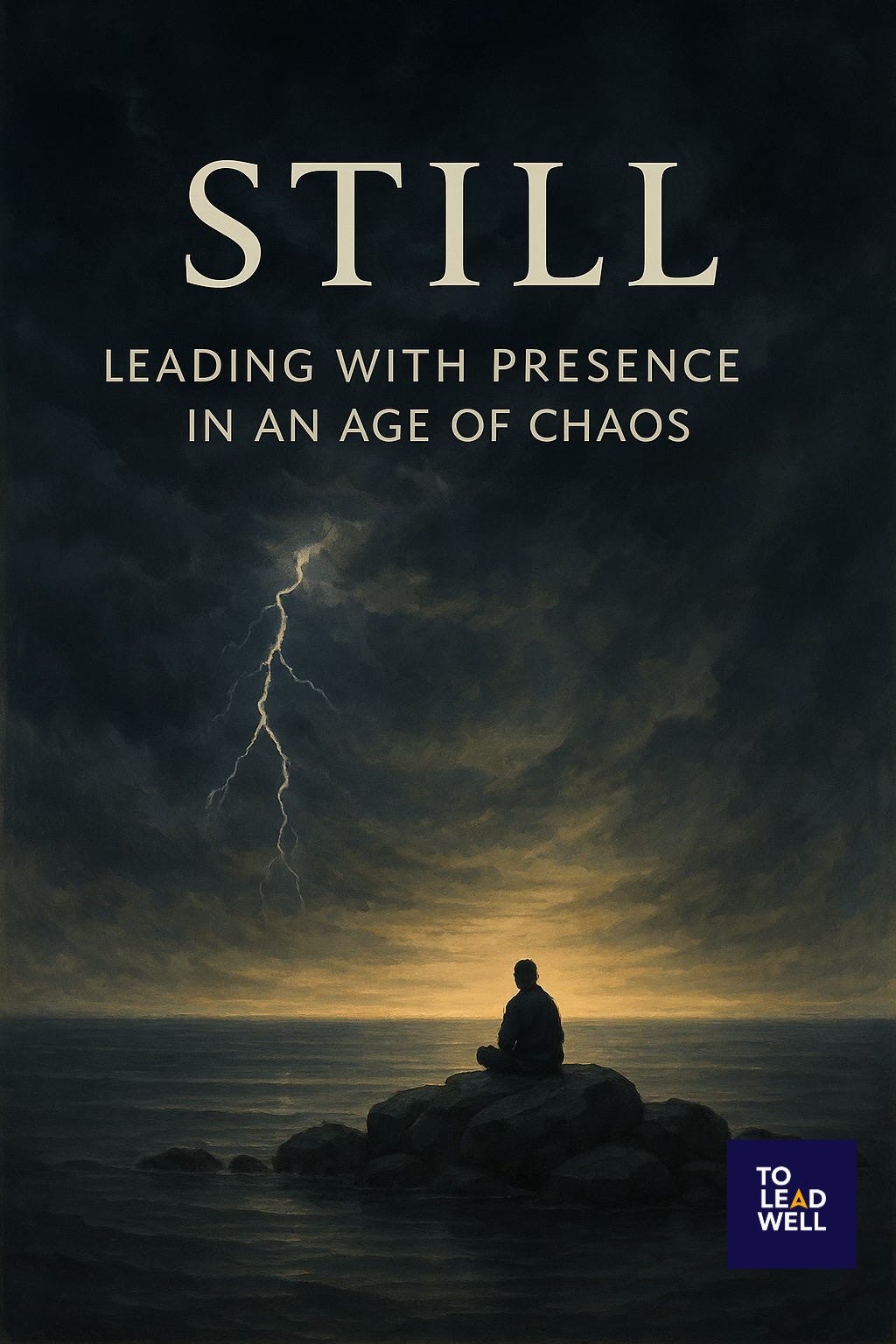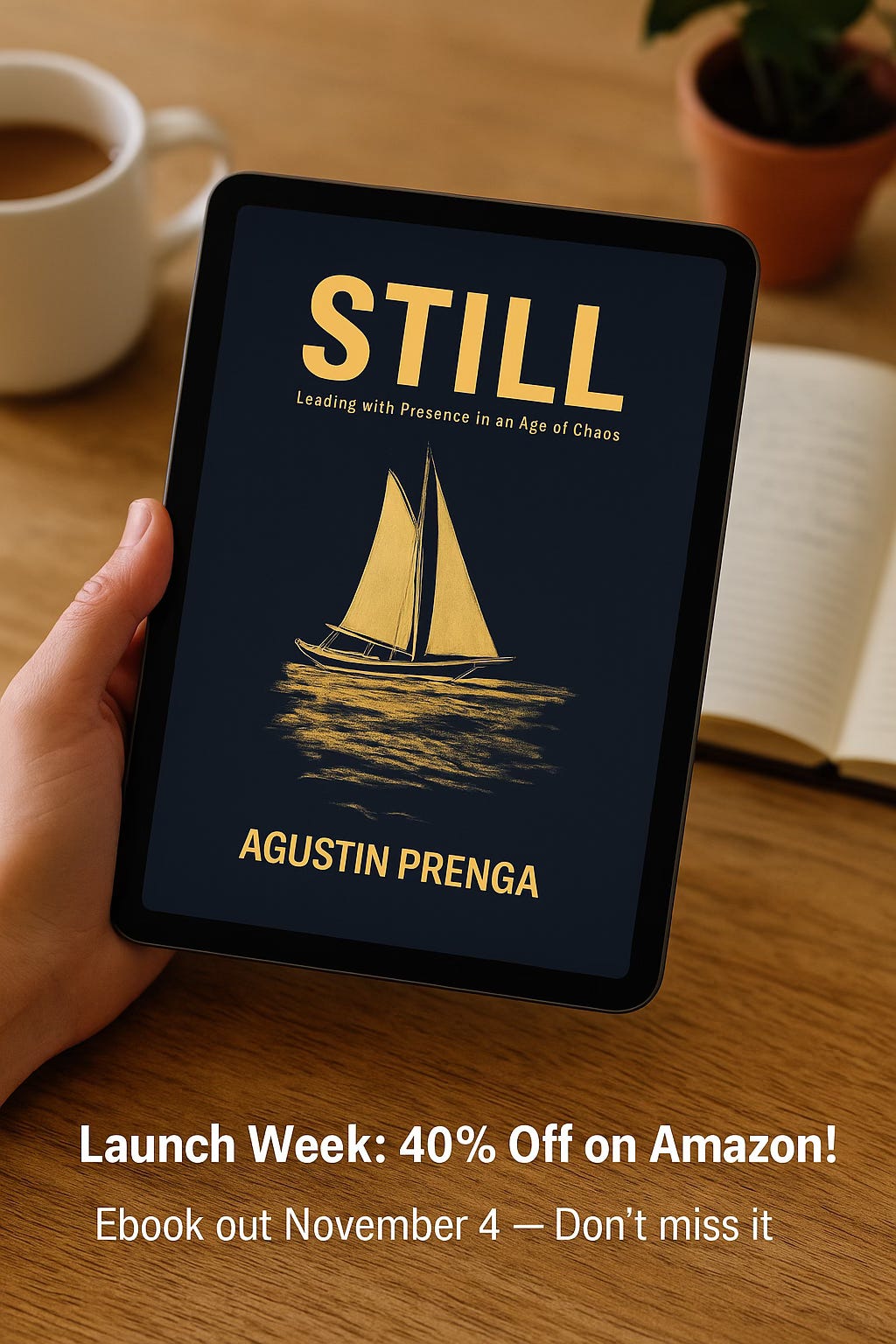STILL
Leading with Presence in an Age of Chaos.
I’ve been thinking a lot about what breaks leaders.
Not the dramatic failures, those are easier to name. I’m talking about the silent unraveling: the capable leader who can’t remember the last time they felt fully present, the compassionate pastor who realizes they’re running on fumes, the executive who’s mastered efficiency but lost something essential along the way.
Over the past few years, I’ve walked alongside leaders in many contexts, not as an expert, but as a fellow traveler. And again and again, I’ve seen the same pattern: good people stretched thin by a world that won’t slow down.
Here’s what I’ve learned: Beneath our exhaustion lies something deeper than burnout. There’s a cultural storm reshaping how we think, relate, and lead. Until we name it, we can’t find our way through it.
So let me name four forces I see at work, and why I believe the way forward isn’t about doing more, but about being still.
The Attention Economy
Your phone is the most effective attention-hijacking tool in human history.
Research shows we switch tasks every 47 seconds, on average.1 But the true cost isn’t just distraction, it’s what we’re losing: the inner space where discernment grows, where wisdom forms, where we become the kind of people who can actually lead.
When silence feels unbearable, we fill it with noise. Scrolls, alerts, conversations that leave us emptier than when we started.
Yet every great leader I’ve studied, in faith, in business, across generations, drew strength from stillness. Presence is not passivity; it’s power under control.
Epidemic Loneliness
We’re more “connected” than ever, and many leaders have never felt more alone.
Digital connection can’t offer the depth we need to endure real pressure. Strong communities have always known this: resilience is built in relationship. Wisdom is shared, not streamed.
But we’ve traded interdependence for efficiency. And it’s costing us.
The leaders who last don’t just build teams, they build relationships that can bear weight.
Toxic Polarization
Everything feels divided right now.
Nuance gets mistaken for weakness. Middle ground feels like betrayal. And in that environment, it takes real courage to lead with both conviction and empathy.
Real leadership listens deeply and speaks clearly. It refuses to reduce people to categories. The most transformative leaders across history could stand firm in truth yet extend grace across divides. That kind of centered strength doesn’t just change companies, it changes cultures.
The AI Revolution
Artificial intelligence is transforming how we work, learn, and lead. It promises efficiency, and delivers it.
But it also confronts us with a deeper question: What makes leadership truly human?
When algorithms can analyze emotion and write strategy, what remains uniquely ours is presence, empathy, wisdom, shared humanity. No machine can embody care. Leadership is needed most not when things run efficiently, but when people are hurting.
Technology may accelerate our pace, but only presence restores our soul.
Why “Still”?
The word still carries a richness we’ve largely forgotten.
It comes from an ancient root meaning “to stand, to be fixed, to remain”, not simply the absence of motion, but strength that doesn’t waver. A quietness that holds steady under pressure.
In the biblical tradition, this deepens. Two Hebrew words illuminate what it means to be still:
Raphah (רָפָה) — to let go, release, loosen one’s grip (Psalm 46:10)
Damam (דָּמַם) — to be silent, to grow quiet, to wait in calm expectation (Psalm 62:1)
Together, they reveal stillness not as inaction, but as active trust—a releasing of our compulsive need to control while waiting with quiet confidence in something larger than ourselves.
In an age of noise, urgency, and fear, to be still becomes a radical act of both wisdom and faith.
This ancient understanding of stillness—raphah and damam—is what I mean when I talk about leading with presence.
It’s the heartbeat behind my new book, Still: Leading with Presence in an Age of Chaos, releasing November 4 on Amazon.
The book draws from my experience walking with Christian leaders around the world and explores how the formation of the soul can renew our leadership from the inside out.
This isn’t a call to slow down for its own sake, it’s an invitation to lead from a deeper place.
Because leadership in this moment isn’t about control; it’s about calm.
It isn’t about pace; it’s about presence.
Sometimes you have to name the storm before you can find the calm center.
May you find that center, and lead from it.
Which of these four forces do you feel most acutely in your own leadership right now? I’m curious what resonates, and what I might be missing.
I would appreciate you checking it out for yourself and sharing it with your circle of influence.
Available worldwide on Amazon in both ebook and print formats. Here are the direct links:
USA Market , Still on Amazon →
United Kingdom, Italy , Germany , France, Spain, Canada, Australia, India.
Gloria Mark, Attention Span (Hanover Square Press, 2023).




I’d say leading with both conviction and empathy is one of the hardest things for me these days. It takes a lot of honest self-inspection to hold on to truth while still extending grace, especially when disagreement feels like a wall. But I’m learning that meeting in the middle isn’t about each person giving 50/50; it’s about both trying to give 100/100, and choosing to close the gaps when the other can’t give more.